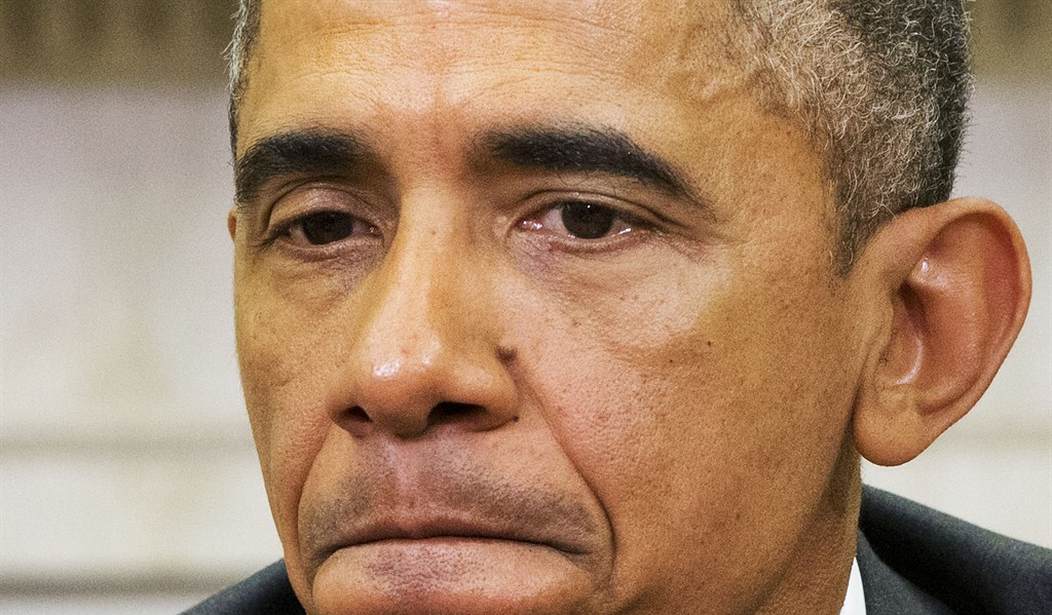Now that the ridiculous brouhaha over 47 Senate Republicans' entirely appropriate letter to Iran's leaders has begun to subside, the Obama White House again finds itself isolated on the issue. The Senate is expected to move toward a pair of measures that the administration says would undermine, or even torpedo, negotiations with Tehran. One bill, authored by Sen. Mark Kirk (R-IL), would trigger strict sanctions, sending a strong message to the regime that walking away from negotiations, or violating the terms of a potential deal, would meet with serious consequences. The other bill, written by Sen. Bob Corker (R-TN), would mandate that Congress have the opportunity to review and either approve or reject any bargain that may emerge. Vote counters in each party reportedly believe that various threats and pleading from the White House
Advertisement
Even as the White House ramps up pressure on Congress to stay out of its negotiations with Iran on a nuclear agreement, Republicans are on the brink of veto-proof majorities for legislation that could undercut any deal. And that support has held up even after the uproar last week over the GOP’s letter to Iranian leaders warning against an agreement. Though several Democratic senators told POLITICO they were offended by the missive authored by Sen. Tom Cotton (R-Ark.), none of them said it would cause them to drop their support for bills to impose new sanctions on Iran or give Congress review power over a nuclear deal...Though the White House has seized on the GOP’s “open letter to the leaders of the Islamic Republic of Iran” in an effort to shift the politics of the nuclear negotiations in its favor on Capitol Hill, there’s no evidence it’s working so far. Nearly all of the 54 Republicans and more than a dozen Democrats in the Senate remain at odds with the president on the issue...Aides in both parties put their vote counts for the bills in the mid-60s, but they’re confident that if either comes to the floor, additional Democrats will back them.
Politico's story notes that the House of Representatives passed a tough Iran sanctions bill in 2013 by a lopsided 400-20 vote. Another "complication" plaguing the White House is yesterday's admission by the British foreign minister that the
Recommended
Advertisement
Iran has been listed by the US State Department as the world's top exporter and financier of terrorism for years (though they've gotten a mysterious and timely partial reprieve from the administration, underscoring the latter's desperation); they're also
Advertisement
Iran is on the march across the Middle East. The regime in Tehran is turning Iraq (a country thousands of Americas died to liberate) into an Iranian proto-satellite state. It is propping up the murderous regime of Bashar al-Assad in Syria that has killed some 200,000 people. It is using proxies such as Hamas, Hezbollah and the Houthis in Yemen to conduct jihad against the West. And President Obama is trying to turn Iran into a partner in peace — promising that if Iran cooperates with the United States, it could become “a very successful regional power.” Iran already is “a very successful regional power.” And it believes it could become even more successful if it had a nuclear weapon. The Obama administration is negotiating an accord that would bring Iran closer to that objective. The agreement Obama is negotiating would reportedly lift sanctions on Iran without requiring the regime to dismantle a single element of its nuclear program or cease its development of intercontinental ballistic missiles. This means that when the accord expires in a decade (another disastrous concession) Iran could then break out as a nuclear power with missiles that can deliver mass destruction far beyond the Middle East.
The result could be a nuclear arms race in the Middle East, as the United States’ Gulf allies race to develop a nuclear deterrent of their own to counter a nuclear Iran. And a nuclear Iran would be even more emboldened to destabilize its neighbors and seek to impose its hegemony across the region. So let’s be clear: With all due respect to Miss Manners, protocol breaches are the least of our problems. To the contrary, we should be thankful there are still leaders in Washington like Cotton who are willing to throw their bodies on the tracks to stop the runaway train of Obama’s failed Iran policy.
Advertisement
Secretary of State John Kerry, meanwhile, continues to tout Ayatollah Khamenei's alleged "fatwa" against nuclear weapons as evidence of Iran's benign intentions. This is borders on delusional for several reasons. First, Kerry obsequiously bestows "great respect" upon the "important" religious edict. If that's true, the Weekly Standard wonders whether the administration's respect extends to a host of other bloodthirsty and primeval fatwas issued by the Iranian regime. Second, Andy McCarthy cites evidence that the fatwa in question doesn't exist, and even if it did, Iran's past and present behavior suggests that it has no bearing on Tehran's illicit geopolitical designs. Also, is it any wonder that even many Democrats are exhibiting less-than-robust faith in the Obama administration's handling foreign policy? After all, Kerry is now openly stating that the US must negotiate with Syria's Assad, a man he recently likened to Adolf Hitler. He didn't do so many years ago during his Senate days, but in his current capacity as Secretary of State. That was post-"red line," of course, and pre-total collapse, resulting in today's shambolic and deadly status quo. (In Kerry's defense, at least he didn't go quite as far as his predecessor, Hillary Clinton, who hailed Assad as a "
Advertisement
Smart power.

























Join the conversation as a VIP Member